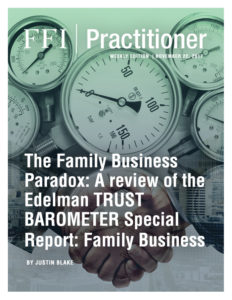
View this edition in our enhanced digital edition format with supporting visual insight and information.
Prepare to be surprised when you read this week’s article by Justin Blake of Edelman. It’s a cautionary tale on perception vs reality when it comes to trust and the family business.
Introduction
Edelman has been studying trust for the past 17 years. Over this time, we have seen a decline in trust across the institutions of business, government, NGOs and media. With trust in business in decline, and as a family business ourselves, we sought to better understand the perception of our sector, particularly in an era of widespread uncertainty. We began studying family business trust specifically in 2014, and our research showed that family business was the most trusted form of business globally.
Our new study, the 2017 Edelman TRUST BAROMETER Special Report: Family Business, looks at trust drivers and perceptions of family business among more than 15,000 respondents across 12 countries: U.S., U.K., Brazil, China, Saudi Arabia, Canada, Mexico, Italy, Indonesia, France, Germany and India.
We learned that while family business remains more trusted than business in general, the sector is not recognized for the positive attributes that research has shown family businesses possess, including long-term thinking, innovation and societal contributions. In addition, the family business trust advantage is threatened by pronounced distrust of the next generation.
Findings
The research shows that family business is viewed positively, 16 points more trusted than business in general. Among those with a preference, more than twice as many people would prefer to work for a family business. Being a family business also provides a commercial advantage: those who know which companies are family businesses are three times more willing to pay more for family business products and services. However, this advantage is squandered, as just over one in two respondents (51 percent) know which companies they buy from are family-owned.
The paradox is that family business is not recognized for these positive attributes. Despite creating 50-to-80 percent of jobs globally (Family Firm Institute), fewer than 1 in 3 respondents see family businesses as job creators. Respondents perceive attributes such as long-term thinking, innovation and financial success to be more likely of nonfamily business. Yet for every dollar invested in research and development, family business drives more innovative outputs (measured by the number of patents, new products and revenue generated) than nonfamily business (Academy of Management Journal). Nonfamily business also is perceived as more likely to lead on societal challenges and participate in philanthropy. Research, however, shows that 81 percent of the world’s largest family businesses practice philanthropy (E&Y and Kennesaw State University).
The study also reveals challenges related to next-generation family business leaders and those who inherit their wealth. Next-generation CEOs are 17 points less trusted than founders, and respondents who are employees of family businesses believe that next-generation CEOs are more likely to mismanage the business (63 percent) and are less passionate and committed (56 percent). By massive margins, respondents do not think that people who inherited their wealth deserve what they have compared to those who earned their wealth (66 percent vs. 40 percent), nor do they see them as people worthy of admiration or respect.
Despite these negative perceptions, family business is well positioned to succeed in the current environment, where fears about job loss and the rapid pace of change induce tension between globalization and nationalism. Family business has a seven-point advantage over nonfamily business on being respectful of local customs. Family business is also given significant credit for creating value locally by keeping profits in the countries in which they are earned; respondents ranked this as the No. 2 area of strong performance for family business, versus No. 13 for business in general.
Family business also enjoys a talent advantage. Family business employees lead by 10 percentage points on being committed to achieving goals (59 percent versus 49 percent); wanting to do the best job for customers (66 percent versus 56 percent); and feeling motivated to do well (53 percent versus 43 percent).
Implications
There is a greater and more pronounced imperative for communications from family companies. Silence in today’s world of flux and uncertainty creates risks for the reputational and commercial advantages that family businesses enjoy. But there has never been a more critical time for the voice and perspective of family business to be heard. As consumers, governments and businesses grapple with changes in the workforce due to automation, increased pace of change due to innovation, and political and societal reactions to globalization, family business is seen an employer of choice and as a culturally-aware enterprise—revealing an opportunity and mandate to be more vocal on the topics in which they have a stake.
The expectation isn’t that family businesses share every detail of the enterprise or the family’s personal life. Rather, they should be more transparent about their business operations and next-generation succession plans. Family businesses should explain how the family helps orient the company for generations—not just for the next several quarters. By illustrating how the family’s values propel corporate and social responsibility strategies, family business can help correct misconceptions about the success and contributions of family-owned enterprises. Stories about a family business’s supply chain, decision-making process, or the role of the family in the business can help increase trust in a family business. In doing so, family companies and family members can begin to combat the skepticism that threatens the success of the family enterprise.
Family companies that have thrived for multiple generations have done so by evolving and addressing market, industry and customer changes. The successful family business is adaptive in nature – and now family business must adapt to the new approaches for modern communications and embrace the heightened expectations for transparency in an era of mistrust.
About the Contributor
 Justin Blake leads Edelman’s Global Family Business and Foundations and Executive Positioning offerings. Through the Family Business and Foundations offer, Justin works with some of the world’s leading family companies to build and protect their reputations and maintain trust to advance business objectives. He can be reached at [email protected].
Justin Blake leads Edelman’s Global Family Business and Foundations and Executive Positioning offerings. Through the Family Business and Foundations offer, Justin works with some of the world’s leading family companies to build and protect their reputations and maintain trust to advance business objectives. He can be reached at [email protected].
About Edelman
Edelman is a sixty-four-year-old communications marketing firm that continues to push the boundaries of what PR can do. Grounded by core values and strengthened by its independence, the firm helps clients communicate, engage, and build relationships with their stakeholders.

View this edition in our enhanced digital edition format with supporting visual insight and information.





